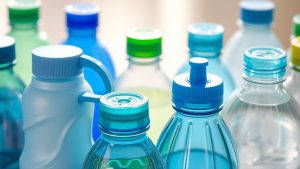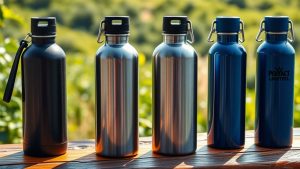
When choosing the best water jug for everyday use, consider stainless steel for its durability and excellent insulation. If you want a non-toxic option, glass is ideal but fragile. Plastic is lightweight and cost-effective, but it may leach chemicals over time. Tritan copolyester offers a balance of durability and safety suitable for active lifestyles, while aluminum is lightweight but may impart taste. To make the best choice, explore the benefits and drawbacks of each material further.
When choosing the best type of water jug, it's essential to evaluate factors like material, durability, and safety, as each option offers unique benefits and drawbacks. Your choice will heavily depend on what you value most—be it insulation, weight, or safety.
One of the most popular options is stainless steel. Known for its durability, stainless steel resists chemical leaching and offers excellent thermal insulation. This means your drinks will stay hot or cold for extended periods. While stainless steel jugs tend to be more expensive initially, their long-lasting performance often makes them a more cost-effective choice over time. Additionally, proper hydration is essential for health and energy, making stainless steel jugs a reliable choice for those prioritizing wellness.
Stainless steel water jugs offer durability, chemical resistance, and excellent insulation, making them a cost-effective choice for long-term use.
Glass water jugs present another appealing option. They're non-toxic, ensuring no harmful chemicals leach into your water. Plus, glass doesn't retain flavors, making it ideal for those who enjoy a rejuvenating drink without any aftertaste. However, you should be cautious, as glass is fragile and can break easily, leading to potential safety hazards.
If you're looking for something lightweight yet functional, plastic water jugs might catch your interest. They're inexpensive and easy to carry, but keep in mind that they can be prone to cracks and leaks over time. Additionally, some plastics may leach chemicals into your water, raising safety concerns.
Tritan copolyester jugs are gaining popularity for their unique properties. This material is heat-resistant, odor-proof, and durable, making it an excellent choice for active lifestyles. Tritan jugs resist stains and maintain their integrity even under impact, making them suitable for outdoor activities. They offer a good balance between weight and durability, though they may not provide the same level of insulation as stainless steel.
Aluminum water jugs are another lightweight alternative. They're durable but can impart a metallic taste to your water unless they've a proper internal lining. This lining is essential for safe usage, as aluminum can react with acidic beverages. While aluminum jugs are generally more affordable than stainless steel options, you'll want to take into account how the taste might affect your drinking experience.
When it comes to hygiene and safety, stainless steel and glass stand out as the best choices. Both materials are non-reactive and safe for storing water, while plastic and aluminum require more caution due to potential chemical leaching.
Environmental impact also plays a role in your decision. Stainless steel and glass are fully recyclable, helping to reduce waste. In contrast, plastic contributes considerably to environmental challenges unless recycled properly.
Conclusion
In conclusion, choosing the right water jug can enhance your daily hydration routine. While you might think glass jugs are too fragile for everyday use, many modern designs are both sturdy and stylish, making them a practical choice for home or travel. Whether you prefer plastic, stainless steel, or glass, there's a jug to suit your lifestyle. Investing in a quality water jug not only promotes hydration but also encourages environmentally friendly habits by reducing single-use plastic waste.



